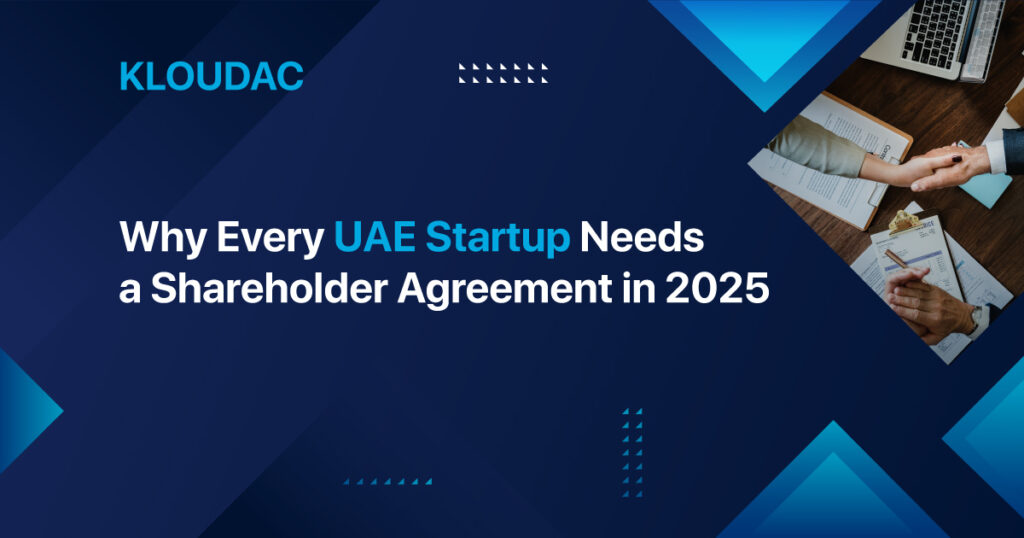The UAE is one of the fastest-growing startup hubs in the world. But as founders celebrate funding rounds and rapid growth, many forget one crucial legal safeguard: the Shareholder Agreement (SHA).
Skipping this step? You could be setting your business up for disputes, deadlocks, and even collapse.
This guide explains why a shareholder agreement is essential in the UAE, how it works, and how to avoid costly mistakes.
What Is a Shareholder Agreement?
A Shareholder Agreement (SHA) is a private contract between shareholders that governs:
- Ownership structure
- Decision-making rules
- Share transfer processes
- Dispute resolution
- Investor rights and protections
While your company’s Memorandum of Association (MOA) or Articles of Association (AOA) cover the basics, they are often too rigid or generic. The SHA fills in the gaps, especially for startups with unique growth plans, diverse investor types, or fast-evolving markets.
Why Is a Shareholder Agreement So Important in the UAE?
1. Prevents Founder Conflicts
Founders often start businesses as friends or close colleagues. But when the business grows, so do the stakes. An SHA defines who owns what, who decides what, and what happens if someone wants to leave.
2. Protects Investors and New Shareholders
Without a clear SHA, new investors risk buying into unclear structures. This can scare away funding opportunities or lead to legal disputes later.
3. Aligns With UAE-Specific Rules
The UAE has multiple jurisdictions, each with different corporate rules:
| Region | Key SHA Considerations |
| Mainland UAE | Single share class, transfers must be notarized, rigid MOA structures |
| DMCC Free Zone | Allows multiple share classes, more flexible for startups |
| DIFC & ADGM | Based on English common law, preferred by international investors |
What Should a UAE Shareholder Agreement Include?
A proper SHA should cover:
Ownership and Capital Contributions
- Who owns what percentage
- Sweat equity vs cash investments
Voting Rights and Decision Making
- Reserved matters (major decisions needing special approval)
- Board composition and appointment rights
Share Transfer Rules
- Pre-emption rights (existing shareholders get first offer on shares for sale)
- Tag-along rights (minority shareholders can sell if the majority sells)
- Drag-along rights (force minority shareholders to sell in full buyouts)
Exit and Valuation Clauses
- Buy-sell provisions if a founder exits
- Agreed valuation methods to prevent disputes
Dividends and Profit Distribution
- How and when profits are shared
- Reinvestment policies
Intellectual Property Ownership
- Clear assignment of IP created by founders or employees
Deadlock and Dispute Resolution
- Use of arbitration (common in UAE)
- Jurisdiction (DIFC/ADGM courts preferred for international investors)
Common Mistakes to Avoid
Many startups in the UAE make these critical errors:
- Using a foreign template that doesn’t match UAE law
- Relying only on the MOA/AOA for governance
- Ignoring future funding rounds, convertible notes, or SAFE agreements
- Choosing the wrong legal jurisdiction for dispute resolution
What Happens If You Don’t Have a Shareholder Agreement?
Skipping an SHA can lead to:
- Founder disputes with no legal resolution
- Investor withdrawal due to lack of protections
- Business paralysis during deadlocks
- Expensive legal battles if informal promises go unenforced
Final Tips for UAE Startups
| Do This | Avoid This |
| Align your SHA with UAE laws and free zone rules | Copying foreign templates blindly |
| Involve your legal advisor early | Waiting until a conflict arises |
| Plan for future funding and exits | Locking in rigid clauses that don’t evolve |
Stay Legally Ready as You Scale
Whether you’re setting up in Dubai, Abu Dhabi, or a free zone, a tailored Shareholder Agreement protects your startup from the inside out. It’s not just paperwork; it’s your roadmap for growth, governance, and exit.
Need Help Drafting Your Shareholder Agreement?
At KLOUDAC, we help UAE startups and SMEs draft legally sound, investor-ready shareholder agreements that comply with local regulations.
Whether you’re operating in the mainland, DMCC, DIFC, or ADGM, our team provides tailored support for SHA drafting, share structuring, funding round preparations, and equity
